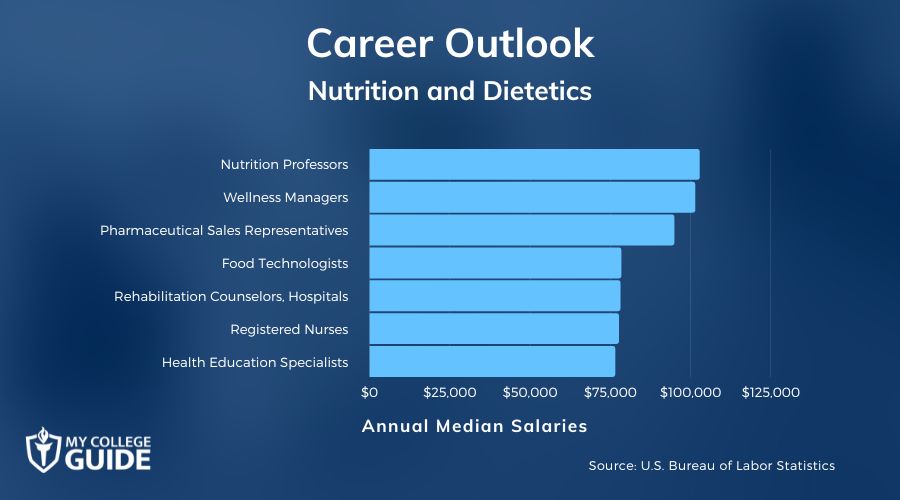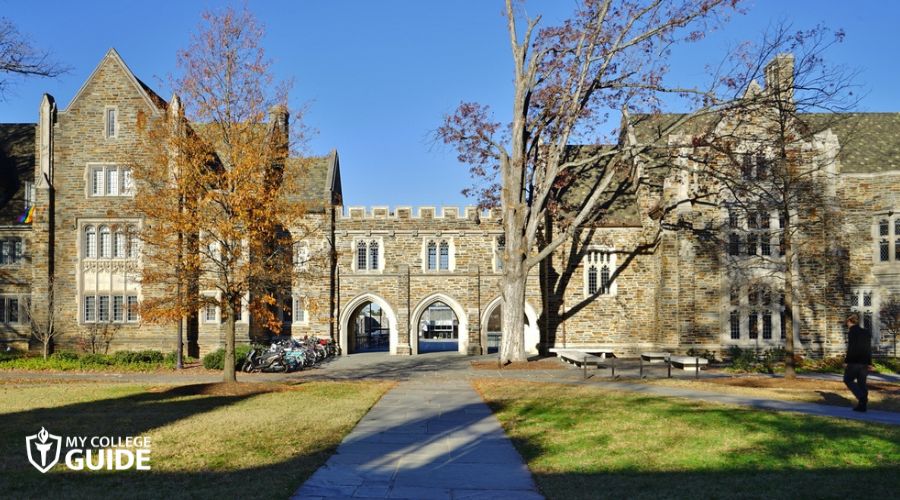Are you interested in the science of food and enjoy helping others enhance their lives through healthy eating? Then an online nutrition degree can get you started in a rewarding career.

Editorial Listing ShortCode:
Whether you offer nutrition counseling to individual clients or work within the healthcare field, there are a number of ways to utilize your nutrition degree after graduation.
Online Bachelor’s in Nutrition Degrees

Typically, the starting qualifications for entry-level positions within the field of nutrition require a bachelor’s degree. Due to this, most accredited universities begin offering their online nutrition degrees at this level.
Editorial Listing ShortCode:
The science of nutrition is a constantly evolving field, and an online bachelor’s degree will help prepare you to take on professional positions within the industry. Through the knowledge and skills you achieve during the course of this program, you will be able to assist patients and clients with improving their quality of life through dietary modifications.
Throughout the course of an online bachelor’s degree in nutrition program, you will take a number of specialty classes that may include:
- Food safety and microbiology
- Nutritional counseling
- Nutrition for special populations
- Nutritional analysis and planning
A bachelor’s degree in nutrition is the first step toward becoming a registered dietitian. To obtain your license after graduation, you would then need to complete an ACEND-accredited internship and pass the certification examination.
Nutrition and Dietetics Careers & Salaries

Those with an online degree in nutrition typically work one-on-one with clients to help them improve their well-being through better dietary choices.
Other graduates may have the opportunity to pursue careers in management positions within the food or healthcare industry. Below we have listed a few of the top jobs within the field of nutrition, as well as their median annual salaries according to the U.S. Bureau of Labor Statistics (BLS):
| Careers | Annual Median Salaries |
| Nutrition Professors | $102,720 |
| Wellness Managers | $101,340 |
| Pharmaceutical Sales Representatives | $94,840 |
| Food Technologists | $78,340 |
| Rehabilitation Counselors, Hospitals | $78,070 |
| Registered Nurses | $77,600 |
| Health Education Specialists, Hospitals | $76,450 |
| Public Health Social Workers | $60,840 |
| Certified Diabetes Educators | $60,600 |
| Health Education Specialists | $48,860 |
As you can see, there are several career paths available in nutrition across a range of industries. While those who graduate from this program typically earn a yearly salary greater than the national average across all occupations, you may make more or less based upon your specific experience level and skillset.
Please keep in mind that some employers look for a minimum of a bachelor’s degree to be considered for a few of these positions. With greater awareness of food quality and people becoming more interested in healthy food choices, those who work within the field of nutrition have a positive career outlook.
Editorial Listing ShortCode:
According to the U.S. Bureau of Labor Statistics, dietitians and nutritionists can expect to see a 7% over the next 10 years. The average annual salary of those who work in the field of nutrition can vary based on the industry in which they are employed.
View our list of the top 40 nutrition careers to compare jobs and salaries in this field.
Bachelor of Science in Nutrition Curriculum & Courses

When you pursue a Bachelor of Nutrition degree, you’ll learn about nutrients and how they affect the human body. Online degrees in nutrition often include these courses:
- Introduction to Food Science: This course presents an overview of career opportunities in human nutrition and food science and the essential principles of food.
- Principles of Human Nutrition: During this class, students develop an understanding of nutrient functions, including food choices and dietary adequacy.
- Nutrition Across the Life Cycle: Students in this course examine nutrition issues at every age, from pregnancy through adulthood.
- Human Nutrition and Metabolism: In this class, students discuss the fundamental concepts of metabolism and how they influence human nutrition.
- Food Resources and Society: This course explores how the basic elements of food science, including food chemistry and processing, relate to societal progress and social controversy.
- Food and Culture: Cultures around the globe have unique cuisines, and students taking this course discover how regional and cultural food traditions affect human diets, health, and economic decisions.
- Public Health in Rural and Urban Communities: In this class, students learn about different approaches to community and public health, including mental, environmental, and occupational health, as well as nutrition.
- Food Laws and Regulations: Students taking this course learn about commercial grading standards, laws, and regulations in the food industry.
- Food Microbiology: This class focuses on the epidemiology of foodborne illnesses, food preservation, and food fermentations.
- Nutrition in Physical Activity and Health: In this course, students learn about the connections between nutrition, health, exercise, and sports.
Nutrition degrees with concentrations, such as food technology, may involve additional electives or core requirements.
How to Choose an Online Bachelor’s Degree in Nutrition Program

With the number of online nutrition degree programs available, it is important to choose a school that is respected within the industry.
By looking into the factors below, you can reduce the chances of enrolling in a degree mill school that is not recognized in the professional workforce. There are several factors to consider when choosing an accounting school online. Below we discuss a few essential factors that you should look into during the process of choosing an accounting program:
- Accreditation: Accreditation is an essential aspect of a reputable online degree program. Check to see if your chosen school is accredited.
- Student-to-Faculty Ratio: Beyond an accredited curriculum, it is also important to ask prospective colleges about their student-to-faculty ratios within the Nutrition program. The best online universities have policies that ensure small class sizes that can support students in getting the individualized instruction they need to succeed in their courses.
- Academic Advising and Student Services: Throughout your educational journey, you may find that you need additional support from your school to reach your full potential. There are several services available to online students working on a nutrition degree.
- Cost: The cost of each program is also an important factor. Compare various programs to see which one fits your budget.
- Degrees Offered: Be sure to check with each school you are considering to ensure they offer your chosen degree program. Also, compare the various programs’ coursework to ensure the coursework fits with your desired career goals.
By doing your research beforehand, you can ensure that your degree will be respected by future employers within the workforce.
Admissions Requirements

Although every college and university has a unique application process, there are some common requirements, including:
- Recommendations: Seek recommendations from instructors or supervisors have detailed knowledge of your skills, interests, and abilities.
- Transcripts: Official transcripts from any schools you previously attended are evidence of your academic achievements.
- Test scores: Some schools require students to submit minimum scores from tests like the SAT or ACT.
- Personal statement: Use this brief essay as an opportunity to make your application stand out.
You may also be asked to submit a university application and pay a fee.
Nutrition Ongoing Education

Typically, the starting qualifications for entry-level positions within the field of nutrition require a bachelor’s degree. Due to this, most accredited universities begin offering their online nutrition degrees at this level.
If you’d like to start your own nutritional practice or apply for management positions in the field, then an online master’s degree in nutrition is an excellent way to further your skills and education. Throughout the course of your graduate degree program, you will take advanced courses that prepare you for work within a variety of professional industries.
These courses may include:
- Advanced foods and nutrition
- Clinical nutrition assessment and Intervention
- Community Nutrition
- Complementary and alternative nutrition therapies
- Environmental health, social movements, and public policy
After completion of your nutrition master’s degree program, you will be able to pursue employment in a number of professional settings, including hospitals, clinics, athletic clubs, and public health programs.
Online Nutrition Degrees Accreditation

Accredited nutrition programs are offered by schools that have undergone a voluntary review of their curriculum by one of the many recognized accrediting agencies throughout the country.
By making sure that your online nutrition degree program is accredited, you will ensure that you are receiving high-quality education and earning a degree that will be professionally recognized. There are numerous regional and national accrediting agencies recognized by the United States Department of Education.
Editorial Listing ShortCode:
For a full list of recognized regional and national agencies, take some time to check out the U.S. Department of Education’s website.
ACEND Accreditation
When researching nutrition programs online, accreditation is an essential factor. Programs that have been evaluated by the Accreditation Council for Education in Nutrition and Dietetics typically have the highest quality curriculum and faculty.
The ACEND specializes in academic programs designed to educate future dietitians, nutritionists, and dietetic technicians. Attending an ACEND accredited school helps ensure that you receive the most up-to-date information in the field. Some employers may only accept degrees from programs with ACEND accreditation.
Nutrition Licensure and Certifications

If your state requires licensure to work as a nutritionist, the requirements might include education, practical experience, and testing. You may also choose to pursue a professional certification, such as:
- Certified Nutrition Specialist (CNS): This certification shows that you are knowledgeable in creating meal plans to meet health needs.
- Registered Dietitian Nutritionist (RDN): An RDN certification indicates that you have skills in educating the public about food and nutrition.
- Certified Diabetes Educator (CDE): Certified CDEs are qualified to offer information about dietary adjustments to treat or prevent diabetes.
A certification may help you qualify for positions or negotiate a higher salary.
Financial Aid and Scholarships

Earning a bachelor degree in nutrition requires a financial investment. To begin your search for funding, file a FAFSA to determine whether you’re eligible for federal loans, grants, or work studies.
Check with your state government to determine if they offer any aid programs for students, based on need, residency, or merit. Scholarships are a valuable source of aid for many students. Search an online database for programs related to your personal circumstances and field of study.
If you are currently working, consult with your employer to determine whether you have access to benefits such as tuition reimbursement or assistance.
What is a Nutrition Bachelor Degree?

A nutrition bachelor degree is an academic program that involves the study of nutrient science and how nutrients in food relate to human health, culture, and psychology. Nutrition majors explore ways to help clients consume healthier diets that better their lives.
Some nutrition programs have concentrations in areas like public health, dietetics, medicine, or food science, while others are more general. Regardless of whether your degree is specialized, during a nutrition bachelor’s program, you will become knowledgeable about the role of nutrition throughout the human lifespan. You’ll also discover how nutrition differs based on geographical location and cultural background.
What Can You Do With a Nutrition Degree?

With their extensive knowledge of nutrients and how they influence health, nutrition majors are well-suited to a variety of careers related to food consumption and production.
Many graduates of these programs go on to become nutritionists and dietitians, who work one-on-one with clients who want to improve their health outcomes. They also work as food scientists, educators, and coaches. Although your future earnings ultimately depend on factors like your employer and geographic location, roles related to nutrition often pay competitive salaries.
According to the Bureau of Labor Statistics, nutritionists and dietitians earn median annual salaries of $61,650.
What Does a Nutritionist Do?

Nutritionists help clients understand how the food they eat affects their health. To achieve this goal, they conduct health assessments and evaluate each client’s current diet.
Editorial Listing ShortCode:
A nutritionist then develops a meal plan tailored to the client’s needs. Most nutritionists are available for ongoing monitoring and check-ins so that food choices can be adjusted as necessary. Many nutritionists also participate in workshops, conferences, and presentations related to nutrition. They share information about nutrition research and the connection between nutrition and human health.
Should I Get an Online Degree in Nutrition?

Programs leading to degrees online have become increasingly popular over the last several years due to the options for flexible scheduling and lower tuition costs. Many of the nation’s top universities now offer online degree programs in the field of nutrition that you can use to get started in a professional career.
There are several advantages to earning your nutrition degree online, and these benefits include:
- Options to schedule classes around your work and family obligations
- Flexible internship opportunities to complete nutrition and dietician licensing requirements
- Opportunity to complete your degree program in less time with accelerated classes or credits by examination
Typically, online degree programs work best for students who are motivated self-learners with high organizational skills. Throughout the course of your online program, you will also have access to interactive educational platforms that provide you the opportunity to connect with leading nutritional experts and students from across the country.
How Long Does it Take to Get a Bachelors Degree in Nutrition Online?

Your enrollment status and the structure of the academic program you attend determines how long it will take you to complete a nutritionist degree online. If you are enrolled full-time in a typical 16-week semester program, you will likely graduate in four years.
An accelerated degree program with a year-round schedule of 8-week semesters may allow you to finish more quickly. You will also have a shorter timeframe if you already have transferable college credits. Students who take classes part-time, such as working professionals or parents, may need one or more additional years to complete their degrees.
What Nutrition Major Jobs Can I Get?

For many students in nutrition programs, the ultimate goal is to become a nutritionist or dietitian, but there are other career paths available.
You may choose to become a health education specialist who teaches the public about the importance of good nutrition. Some nutrition majors also simultaneously seek a teaching certification so that they are qualified to work in high schools.
Editorial Listing ShortCode:
Nutrition students who prefer the research aspect of the field opt to become food scientists. Professionals in this role are responsible for studying the elements of food and ensuring that food is safe and nutritious enough for human consumption.
What’s the Difference Between a Dietitian vs. Nutritionist?

Dietitians and nutritionists have overlapping knowledge and responsibilities, but they are distinct careers. The differences include:
- Education: Dietitians generally complete a longer period of education before becoming licensed or certified and entering the workforce.
- Licensure requirements: Some states don’t require nutritionists to become licensed, but licensure is required for dietitians in most states.
- Career paths: Unlike nutritionists, dietitians are often qualified to offer treatment and prevention strategies for medical conditions.
Before choosing a career path, consider how much time you want to dedicate to your education, whether you want to become licensed, and if you want to offer medical care.
What’s the Difference Between a Nutrition Coach vs. Nutritionist?

Although the terms are nearly identical, nutrition coaches and nutritionists differ in several ways, including:
- Focus: Nutritionists usually have education in health, while nutrition coaches emphasize fitness and athletics.
- Certification requirements: Many states do not require nutritionists to become certified but do have certification requirements for nutrition coaches.
- Education: Nutritionists often have a four-year degree, whereas nutrition coaches may have a two-year degree or certificate.
Nutritionists and nutrition coaches have similar work environments, and both work as independent consultants.
Is a Bachelors in Nutrition Science Degree Worth it?

Yes, a bachelors in nutrition science degree is worth it for many students. After graduating with a nutrition degree, you may be qualified for positions with a wide range of employers, including hospitals, long-term care facilities, community health programs, schools, and food companies.
Editorial Listing ShortCode:
Nutrition is essential to building a healthy and thriving society, so careers in this area are expected to remain steady or grow over the next several years. According to the Bureau of Labor Statistics, the projected growth rate for dietitians and nutritionists is 7%, which is as fast as the average for all occupations.
Universities Offering Online Bachelor in Nutrition Degree Programs
Methodology: The following school list is in alphabetical order. To be included, a college or university must be regionally accredited and offer degree programs online or in a hybrid format.

A BS in Public Health with a concentration in Nutrition and Wellness may be earned through American Public University. The program is fully online. Up to 90 of the 120 required credits may be transferred. Courses are 8 to 16 weeks long, and there are start dates each month.
American Public University is accredited by the Higher Learning Commission.

Appalachian State University offers a BS in Nutrition and Foods. The program requires 120 credits and is available online. Courses follow a semester schedule and are offered in the fall, spring, and summer. Potential courses include Basic Food Science and Quantity Food Production.
Appalachian State University is accredited by the Southern Association of Colleges and Schools Commission on Colleges.

A BS in Food and Nutrition Entrepreneurship may be earned through Arizona State University. The program is fully online and requires 120 credits. Courses are 7.5 to 15 weeks long, and there are start dates throughout the year. Various tracks are available including Community Nutrition, Food Service Operations, or Pre-Dietetics.
Arizona State University is accredited by the Higher Learning Commission.

Florida International University offers the opportunity to earn a Bachelor’s in Dietetics and Nutrition with an emphasis in Nutrition Science. The program requires 120 credits and is in a hybrid format, requiring some on-campus attendance. Courses follow a regular semester schedule.
Florida International University is accredited by the Southern Association of Colleges and Schools Commission on Colleges.

Immaculata University offers a BS in Nutrition and Dietetics. The program is available fully online, on campus, or in a hybrid format. Potential courses include Food Fundamentals, Community Nutrition, and Advanced Nutrition. The option of completing a 3+2 program is available to earn a master’s while earning the BS.
Immaculata University is accredited by the Middle States Commission on Higher Education.

A Bachelor’s in Nutrition and Health is offered through Kansas State University with the opportunity to work on a Master’s in Public Health or Dietetics, Nutrition, and Sensory Sciences. The program is entirely online and requires 120 credits. Courses are asynchronous and follow a semester schedule. KSU also offers accelerated intersessions.
Kansas State University is accredited by the Higher Learning Commission.

The National University of Natural Medicine offers a BS in Nutrition. The program is available entirely online or on campus. Most courses are in an asynchronous learning format. Applicants must meet general education requirements before applying. The curriculum requires a capstone project, and courses follow a semester schedule.
The National University of Natural Medicine is accredited by the Northwest Commission on Colleges and Universities.

An online BS in Health Services Management with a concentration in Food Science Nutrition is offered through Norfolk State University. The program requires 120 credits and may include business management courses. Courses are offered in 7 and 15 week sessions with start dates throughout the year.
Norfolk State University is accredited by the Southern Association of Colleges and Schools Commission on Colleges.

Parker University offers a BS in Nutrition Science through a fully online program. The program requires 120 credits, which typically can be completed in 10 terms. Courses follow a regular semester schedule, with multiple start dates each year. Potential courses include Nutrition Counseling and Education and Nutrition in the Life Span.
Parker University is accredited by the Southern Association of Colleges and Schools Commission on Colleges.

A BS in Nutrition is available through Purdue University. The program offers an optional concentration in Holistic Medicine and the option to begin work toward a master’s. Classes are offered in 10 week semesters, with multiple start dates each year. The program is entirely online and requires 180 credits.
Purdue University is accredited by the Higher Learning Commission.

Sacred Heart University offers an online BS in Health Science with a concentration in Dietetics and Nutrition. The program requires an associate’s degree or general education requirements. Courses are available in half-terms. On average, the degree can be earned in 2 years.
Sacred Heart University is accredited by the New England Commission of Higher Education.

Southern California University of Health Sciences offers the opportunity to earn a BS in Health Sciences with a concentration in Integrative Nutrition and Wellness. The program is designed for degree completion, and general education requirements must be met before applying. Courses follow a semester schedule with start dates in the fall, spring, and summer.
SCUHS is accredited by the Western Association of Schools and Colleges.

Texas Woman’s University offers a BAAS in Health Sciences with an emphasis in Nutrition. The program is available in a hybrid format, with some courses offered at the TWU campus. The program is designed for degree completion and requires 120 credits.
Texas Woman’s University is accredited by the Southern Association of Colleges and Schools Commission on Colleges.

Touro University offers a BS in Health Sciences through the school’s Worldwide online learning program. The school also offers a Health Care Administration track with a concentration in Nutrition and Health. Up to 90 of the 120 required credits may be transferred into the program. Courses are 8 weeks long.
Touro University is accredited by the Middle States Commission on Higher Education.

The Best Schools listed the University of Alabama as one of the best schools in the country for online bachelor’s degrees in nutritional sciences. The school’s fully online program offers a BS in Food and Nutrition. The program requires 120 credits and satisfies some of the requirements to become a registered dietitian.
The University of Alabama is accredited by the Southern Association of Colleges and Schools Commission on Colleges.

The University of Arizona offers an online BS in Nutritional Sciences through its College of Agriculture and Life Sciences. Dietetics and Nutrition concentrations are also available. The school is one of only four schools in the nation accredited by the Academy of Nutrition and Dietetics.
The University of Arizona is accredited by the Higher Learning Commission.

The University of Kansas offers the opportunity to earn a Bachelor of Health Science with a minor in Nutrition through the school’s fully online program. The program requires 120 credits, including a capstone project and a minor. Courses follow a regular semester schedule, with start dates in the fall, spring, and summer.
The University of Kansas is accredited by the Higher Learning Commission.

EDSmart ranked the University of North Dakota as one of the best online universities in the country. The school offers an online BS in Human Nutrition with an optional Health Promotion and science tracks. Courses are in an asynchronous learning format and follow the same schedule as those on campus.
The University of North Dakota is accredited by the Higher Learning Commission.

A BS in Nutrition and Dietetics is available through the University of North Florida’s Didactic Program in Dietetics. All upper-level courses in the concentration are available online. General education and lower-level courses are taken on campus. Courses are offered in accelerated half-terms or full terms. There are at least 6 start dates each year.
The University of North Florida is accredited by the Southern Association of Colleges and Schools Commission on Colleges.

Weber State University offers a BS in Nutrition Education with the option to choose an emphasis, including Integrative Nutrition or Sports Nutrition. The Integrative Nutrition program is fully online, while the Sports Nutrition emphasis is in a hybrid format. The program requires 120 credits. Courses are in an accelerated format.
Weber State is accredited by the Northwest Commission on Colleges and Universities.
Getting Your Bachelor’s in Nutrition Degree Online

If you have a passion for food and want to teach others how to make healthy choices, a nutrition degree may lead to a fulfilling career.
Nutritionists serve an important role in improving public health and helping people achieve their personal goals. While earning a nutrition degree, you will learn about the science of food and nutrients. You may also explore the connection between food choices and physical fitness, medical treatment, and culture.
Your career as a nutrition expert may be just around the corner. Get started by researching accredited online colleges that offer BS in Nutrition degrees online.
